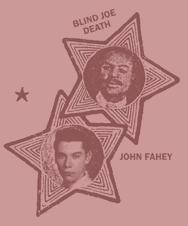

|
John Fahey and the "Sligo River Blues" |
|
Click on this button to play "Sligo River Blues" while reading about the artist/composer John Fahey. |
|
John Fahey is one of the great masters of twentieth century guitar and was a founder of the acoustic guitar movement of the 60's. John Fahey, the son of a United States Public Health Service employee who divorced his mother, grew up desperately unhappy and glued to the radio in Takoma Park, Md. In 1954, he heard Bill Monroe's version of Jimmie Rodgers's "Blue Yodel No. 7." That experience changed him, as did his first exposure to Blind Willie Johnson's "Praise God I'm Satisfied," which, he has said, made him weep. |
|
The young John Fahey had discovered the funky, unpretentious, down-home, spontaneous guitar-oriented 78s recorded in the late 1920s and early 1930s by rural Southern black and poor white folks. He soon became a record collector and dedicated himself to playing guitar. Using money he earned pumping gas, he made his first recording in 1959 and had 95 copies of it pressed; one side of the plain white sleeve read "John Fahey" and the other, "Blind Joe Death," an invented blues singer about whom Mr. Fahey devised an entire mythology. That started his career at Takoma Records, his own label, which he ran until the mid-1970's, when he sold it to Chrysalis. "Sligo River Blues" was on the Blind Joe Death side of this album which was recorded at St. Michael's and All Angels Church in Adelphi, Maryland. |

|
Fahey said about his picking up the guitar:
"I was about thirteen and I saw some other guys, older than me, they were meeting girls in the park in the summer by taking guitars out and playing them and singing country western, so I bought a seventeen dollar Sears and Roebuck Silver charm, the action was about that high, and I got to know these guys and they helped me out with a few chords and stuff. But I didn't meet any girls that way until about ten years later. On the other hand I did learn how to play the guitar."
He toured during his teens with Henry Vestine (later of Canned Heat), and studied for several years at the American University in Washington to gain a BA in Philosophy and Religion. In 1963, he briefly attended the University Of California at Berkeley before transferring to UCLA to study folklore and write his thesis on Charley Patton. Fahey announced himself with a style based on an original folk blues theme, encompassing blues, jazz, country and gospel music, and at times incorporating classical pieces, although retaining an almost traditional edge to his arrangements. His 12-string work, featuring intricate fingerpicking and open tunings, became a major influence on other American acoustic guitarists.
A little known segment of John Fahey's life is concerned with the preservation of the desert tortoise in California.
"Developers are buying up huge amounts of acreage in the desert. When the bulldozers come and tear up the land, the tortoises are left without a home and the desert tortoises are getting kind of rare. So the California Turtle and Tortoise Club and I started a non-profit corporation called the Desert Tortoise Preservation Society. We lease government land and also buy land and don't allow anybody in with a car. That's what's killing them all. The highways, and these crazy guys who go out into the desert with dune buggies and motorcycles and guns and shoot everything they see. You find snakes, rabbits and turtles all shot up. What kind of sport is that? Shooting a tortoise that walks so slowly."
Fahey's personal problems intensified in the 80s as, suffering from diabetes and chronic fatigue caused by the Epstein Barr virus, he fell upon hunting down and selling collectable records to earn money. He retained his cult following, however, and continued to release the occasional album. Fahey affiliated himself with the alternative rock community in the 90s, concentrating on the electric guitar and musique concrete instead of the acoustic blues/folk of his earlier albums.
John Aloysius Fahey turned the last page of his life on February 22, 2001, in Salem, Oregon. A victim of congestive heart failure, Fahey's time ended at the relatively young age of 61.